|
|
|
Sort Order |
|
|
|
Items / Page
|
|
|
|
|
|
|
| Srl | Item |
| 1 |
ID:
100069
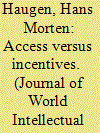

|
|
|
|
|
| Publication |
2010.
|
| Summary/Abstract |
Concerns have been expressed over the role of the World Intellectual Property Organization (WIPO) in influencing the intellectual property policies of other specialized agencies of the United Nations. This article reviews the policies of the Food and Agricultural Organization (FAO), World Health Organization (WHO) and United Nations Educational, Scientific and Cultural Organization (UNESCO), in addition to WIPO itself, and finds very interesting patterns of cooperation. While intellectual property law is primarily concerned with providing incentives for the production of new, creative and applicable arts and knowledge, human rights law is primarily concerned with providing improved access to goods crucial for human well-being and survival. While UNESCO has paid less attention to intellectual property rights over the last decades, rather emphasizing cultural preservation, both FAO and WHO have increased their focus on intellectual property rights. The latter two have increased their cooperation with WIPO, but without a formal agreement with WIPO. The article finds that WIPO, as a specialized agency, has to cooperate with specialized agencies, and there is no reason to believe that the cooperation will be in the form of a "one-way" process in which WIPO instructs the other agencies. At the same time, it must be acknowledged that intellectual property rights can also hamper research, in addition to impacting on the access to the crucial goods.
|
|
|
|
|
|
|
|
|
|
|
|
|
|
|
|
| 2 |
ID:
132540
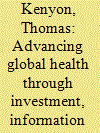

|
|
|
|
|
| Publication |
2014.
|
| Summary/Abstract |
The past decade has witnessed unprecedented levels of investment and engagement in global health spurred by the global HIV/AIDS crisis, the development of the Millennium Development Goals, momentum in polio eradication, and global outbreaks of infectious diseases such as SARS with its US$40 billion cost to society. Characterized by a sense of urgency, pragmatism, and opportunity, global health services and public health systems are being advanced to respond to rapidly expanding demands with dramatic results. However, much more remains to be done. After a decade in emergency mode, the next phase of global health work requires an even more precise approach and smarter investments. Many "donor" nations and organizations have tightened their belts in response to the recent economic downturn, while at the same time increasing the numbers of "recipient" countries, and are now better able to invest more of their own resources to benefit and protect their own citizens. In this climate, global health investments in programs and innovations must be better targeted and better informed by strategic information more than four-fold from US $6.7 billion in 1993 to US $28.4 billion in 2011. Accompanying this investment was a striking decline in mortality in children under five years of age from 12.6 million deaths in 1990 to 6.6 deaths million in 2012. Improvements in health are not the only positive outcome of these investments. The same Commission concluded that global health is a smart investment - for every dollar invested in health, it can be expected that there will be a 10-20 fold return in economic benefit to society. Healthier people are more productive and contribute back to the economy. Healthier people also lower health care costs, naturally, by requiring less care.
|
|
|
|
|
|
|
|
|
|
|
|
|
|
|
|
| 3 |
ID:
132541
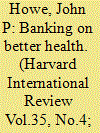

|
|
|
|
|
| Publication |
2014.
|
| Summary/Abstract |
HIV is no longer a death sentence" - that hopeful declaration-which would have been unthinkable even a decade ago- has now become a cliché by repetition whenever experts, physicians, academics and journalists gather to chart progress in fighting the disease and to set goals for the future. But for many people, sadly, that statement is not actually true. There remains no cure for the disease, and not everyone can get access to the anti-retrovirals (ARVs) that have done so much to help so many. This reflects the painful truth that poverty remains a major impediment to good health in the developing and even the developed world.
|
|
|
|
|
|
|
|
|
|
|
|
|
|
|
|
| 4 |
ID:
084511
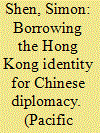

|
|
|
| 5 |
ID:
129896


|
|
|
| 6 |
ID:
122576
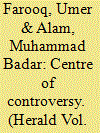

|
|
|
| 7 |
ID:
108253
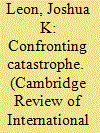

|
|
|
|
|
| Publication |
2011.
|
| Summary/Abstract |
Social environments played a powerful role in the institutional adaptations of the AIDS fighting agencies within the United Nations system. Since its AIDS apparatus has become operational, the UN has undertaken two major strategic shifts. The first shift saw the dissolution of the GPA, a small subunit of the WHO in favour of UNAIDS, a dedicated agency engaged in global advocacy. This shift involved a controversial bureaucratic process that led, finally, to a more human rights-based approach to the disease. The second shift saw an increased emphasis on ground-level efficiency. What caused these changes? Contributions in the rationalist tradition expect the UN to act as a multilateral goal-seeker looking to optimally address a major gap in global governance. A sociological framework sees normative changes within the UN as catalysts for change in its goals and structure. A synthesis of these traditions conceptualizes the UN's strategic shifts more clearly, capturing the interactive process between the organization and its strategic environment. UN agencies were forced to rationally adapt to changing conditions in prevailing AIDS norms.
|
|
|
|
|
|
|
|
|
|
|
|
|
|
|
|
| 8 |
ID:
119894
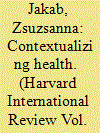

|
|
|
|
|
| Publication |
2012.
|
| Summary/Abstract |
Dr. Margaret Chan, Director General of the World Health Organization, begins her foreword to the 2010 WHO/HABITAT report Hidden Cities:
"It is well known by now that half of humanity lives in urban areas - and the proportion is growing. Cities, with their concentration of culture, infrastructure, and institutions have long driven the progress of civilization and have been the focus of opportunity and prosperity."
|
|
|
|
|
|
|
|
|
|
|
|
|
|
|
|
| 9 |
ID:
128886
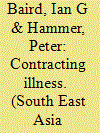

|
|
|
|
|
| Publication |
2013.
|
| Summary/Abstract |
Without much attention to local context, global health policy experiments are being conducted on vulnerable indigenous populations. This article details the history of a development-bank-funded experiment to contract out public health services in Cambodia's north-eastern province of Ratanakiri. The case study highlights the difficulties that flow from improper planning and implementation, as well as the distorting effects that narrowly defined contract performance measures can have on the health of the population as a whole. Progress in global health will not be possible if local context and voices continue to be underappreciated.
|
|
|
|
|
|
|
|
|
|
|
|
|
|
|
|
| 10 |
ID:
174511
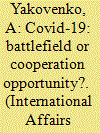

|
|
|
|
|
| Summary/Abstract |
THE PANDEMIC, which from the outset Washington has "promoted" as a "Chinese scourge," was designed to isolate China and put a full stop to globalization as we know it now, a phenomenon seriously affecting all major Western countries, including the U.S. We have witnessed a crisis in relations between Western countries - be it the U.S. and Europe or the European Union.
|
|
|
|
|
|
|
|
|
|
|
|
|
|
|
|
| 11 |
ID:
124516
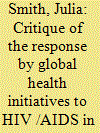

|
|
|
|
|
| Publication |
2013.
|
| Summary/Abstract |
This article provides a critical perspective on global health initiatives (GHIs) in response to HIV/AIDS in post-conflict African countries. Focusing on the Global Fund to Fight HIV/AIDS, Tuberculosis and Malaria, the President's Emergency Plan for AIDS Relief and UN bodies, it argues that many global health initiatives lack consideration of the complexities of addressing HIV/AIDS in post-conflict contexts. It finds that prevention programmes fail to prioritize the population groups who are at high risk; that treatment and care interventions are shaped by an emergency aid paradigm, which does not ensure ongoing well-being for people living with HIV/AIDS; and that global health initiatives often impede the capacity of local governance and health systems. Given that global health initiatives have yet to fully engage with the challenges of implementing HIV/AIDS interventions in conflict-affected African contexts, the article concludes by proposing recommendations in this regard.
|
|
|
|
|
|
|
|
|
|
|
|
|
|
|
|
| 12 |
ID:
132207
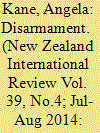

|
|
|
| 13 |
ID:
102170


|
|
|
| 14 |
ID:
140531


|
|
|
|
|
| Summary/Abstract |
In a biological sense, last year’s Ebola epidemic, which struck West Africa, spilled over into the United States and Europe, and has to date led to more than 27,000 infections and more than 11,000 deaths, was a great surprise. Local health and political leaders did not know of the presence of the hemorrhagic fever virus in the 35,000-square-mile Guinea Forest Region, and no human cases had ever been identified in the region prior to the outbreak. Its appearance in the tiny Guinean village of Meliandou in December 2013 went unnoticed, save as a domestic tragedy for the Ouamouno family, who lost their toddler son Emile to a mysterious fever. Practically all the nonbiological aspects of the crisis, however, were entirely unsurprising, as the epidemic itself and the fumbling response to it played out with deeply frustrating predictability. The world has seen these mistakes before.
|
|
|
|
|
|
|
|
|
|
|
|
|
|
|
|
| 15 |
ID:
137759
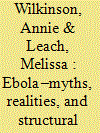

|
|
|
|
|
| Summary/Abstract |
TEN MONTHS AFTER THE FIRST INFECTION, Margaret Chan, Director-General of the World Health Organization, described the Ebola epidemic in West Africa as the ‘most severe acute public health emergency in modern times’. The disaster, she said, represents a ‘crisis for international peace and security’ and threatens the ‘very survival of societies and governments in already very poor countries’.1 As of October 2014, the disease had killed 4,951 and infected 13,567.2 It has crippled families, health systems, livelihoods, food supplies and economies in its wake. These numbers are likely to be vastly underestimated. How did it get to this? Why has this outbreak been so much larger than previous ones? The scale of the disaster has been attributed to the weak health systems of affected countries, their lack of resources, the mobility of communities and their inexperience in dealing with Ebola.3 This answer, however, is woefully de-contextualized and de-politicized. This briefing examines responses to the outbreak and offers a different set of explanations, rooted in the history of the region and the political economy of global health and development.
|
|
|
|
|
|
|
|
|
|
|
|
|
|
|
|
| 16 |
ID:
106269
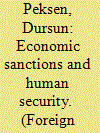

|
|
|
|
|
| Publication |
2011.
|
| Summary/Abstract |
Despite the abundance of country-specific evidence and policy debate on the humanitarian effects of sanctions, there has not been any cross-national empirical research that examines the human cost of sanctions. In this study, I offer a quantitative analysis of the effect that economic sanctions have on public health conditions in target countries. I use the child mortality rate among under five-year olds as a proxy for health status and utilize time-series cross-nation data for the 1970-2000 period. According to the results, the public health effect of sanctions is largely conditional on the extent to which economic coercion is costly on the target economy. The United States as a sender is also likely to increase the negative impact of sanctions on public health conditions. The economic wealth of target countries is unlikely to play any significant interactive role in mitigating the effect of economic coercion on public health. Similarly, the involvement of an intergovernmental organization (IGO) in sanction imposition has no discernable impact on child mortality.
|
|
|
|
|
|
|
|
|
|
|
|
|
|
|
|
| 17 |
ID:
126104
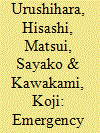

|
|
|
|
|
| Publication |
2012.
|
| Summary/Abstract |
In response to the 2009 H1N1 influenza pandemic, the governments of Japan and the United States for the first time authorized the emergency use of unapproved drugs. In this article, we comprehensively review the different regulatory approaches of Japan and the United States, countries with advanced regulatory and healthcare systems, to emergency authorization of the use of medical products as a countermeasure to public health emergencies. We outline the legal system, range of targeted products, requirements for the application dossier, legal stance for authorization, product availability, and termination of the Japanese Emergency Approval (EA), and we compare characteristics with those of the US Emergency Use Authorization (EUA). We also review the actual cases of these 2009 emergency authorizations. The Japanese EA importation of novel H1N1 influenza vaccines with adjuvant is presented, with lessons learned, and contrasted with the US EUA of peramivir.
|
|
|
|
|
|
|
|
|
|
|
|
|
|
|
|
| 18 |
ID:
137169


|
|
|
|
|
| Summary/Abstract |
The emergency–development continuum, also known as “linking relief, rehabilitation, and development” (LRRD), has been a conceptual, institutional, and programmatic preoccupation for aid organizations and humanitarian policymakers for well over two decades. The objective of this short paper is to introduce the idea of the emergency–development continuum and, only partly ironically, to advance the notion that we should not bother with it: operationally, it has done more harm than good, driving the work of humanitarian organizations in directions that run counter to the interests of the people they are trying to serve.
|
|
|
|
|
|
|
|
|
|
|
|
|
|
|
|
| 19 |
ID:
125309
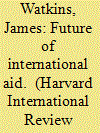

|
|
|
|
|
| Publication |
2013.
|
| Summary/Abstract |
By 2015, we will have nearly eradicated extreme poverty and hanger throughout the world by halving the proportion of people living on under $1.25 per day. We will have achieved universal primary education worldwide, reduced child mortality rates by two thirds, and halted and reversed the spread of HIV/AIDS, malaria and other diseases. We will have promoted gender equality, improved maternal health, and ensured environmental sustainability. Or at least, this is the promise that we made to ourselves, and to each other, almost 15 years ago.
|
|
|
|
|
|
|
|
|
|
|
|
|
|
|
|
| 20 |
ID:
104237


|
|
|
|
|
| Publication |
2011.
|
| Summary/Abstract |
This article explores critically the assumption that the burden of disease remains heavier for women than for men. The impact of gender on health is better understood when the burden of disease is analysed in terms of its two dimensions, the domestic and the public. This dual approach reveals that, concerning the public burden of disease, morbidity and mortality trends are becoming similar for men and women while, with the domestic burden of disease, gender shows that differences seem to persist in men and women's roles within the family, particularly involving illness prevention and management at home. This argument is explored in this paper through two types of evidence: to investigate the domestic burden of disease, reference is made to findings from studies on gender roles in the family; and the public burden of disease is explored using the World Health Organization's latest figures on mortality and morbidity. The domestic and public dimensions of the burden of disease are discussed in the context of ten Asian countries at different stages of socio-economic development (Japan, Singapore, South Korea, Malaysia, Thailand, China, Indonesia, Philippines, Vietnam and Cambodia).
|
|
|
|
|
|
|
|
|
|
|
|
|
|
|
|
|
|
|
|
|